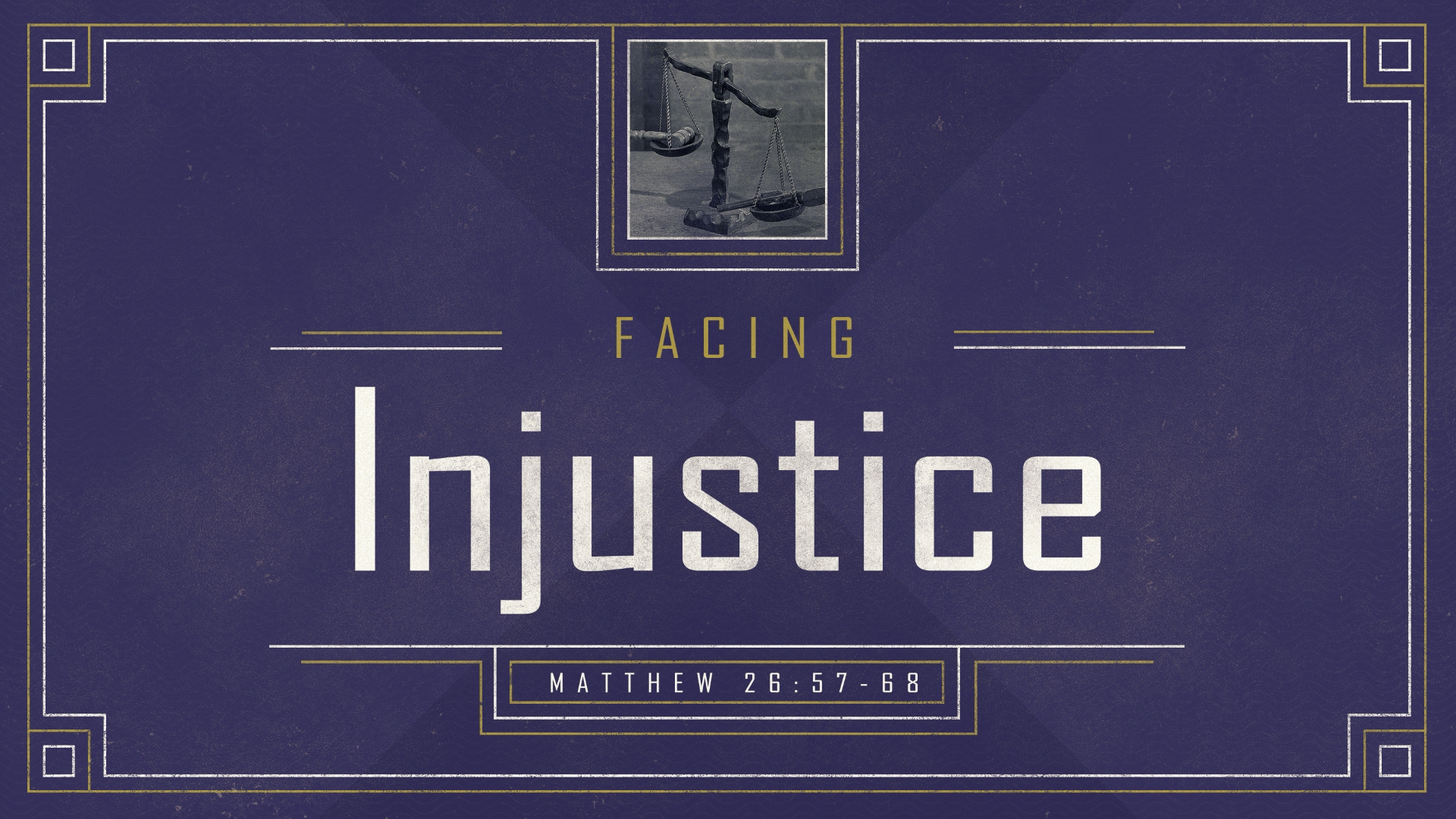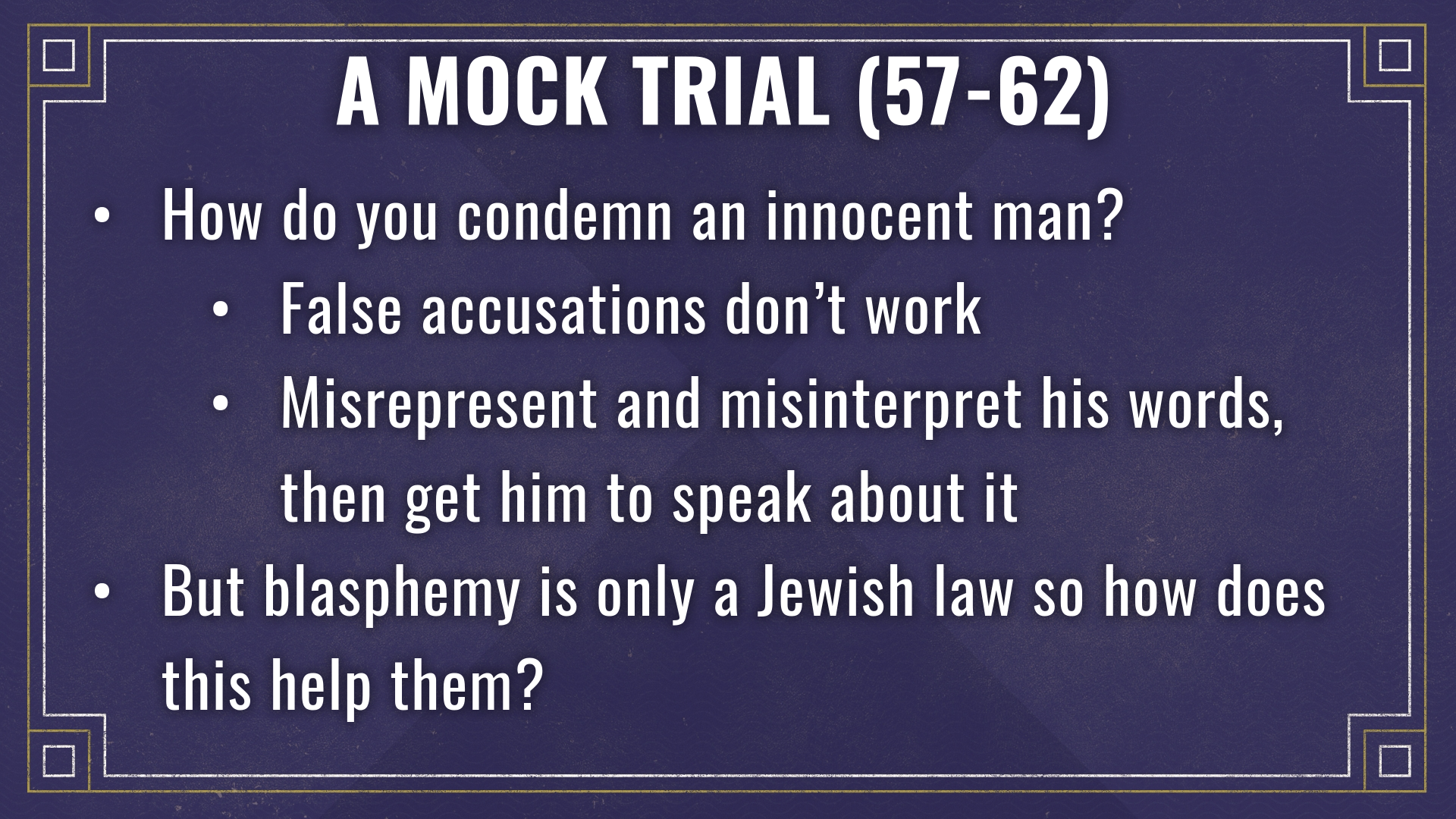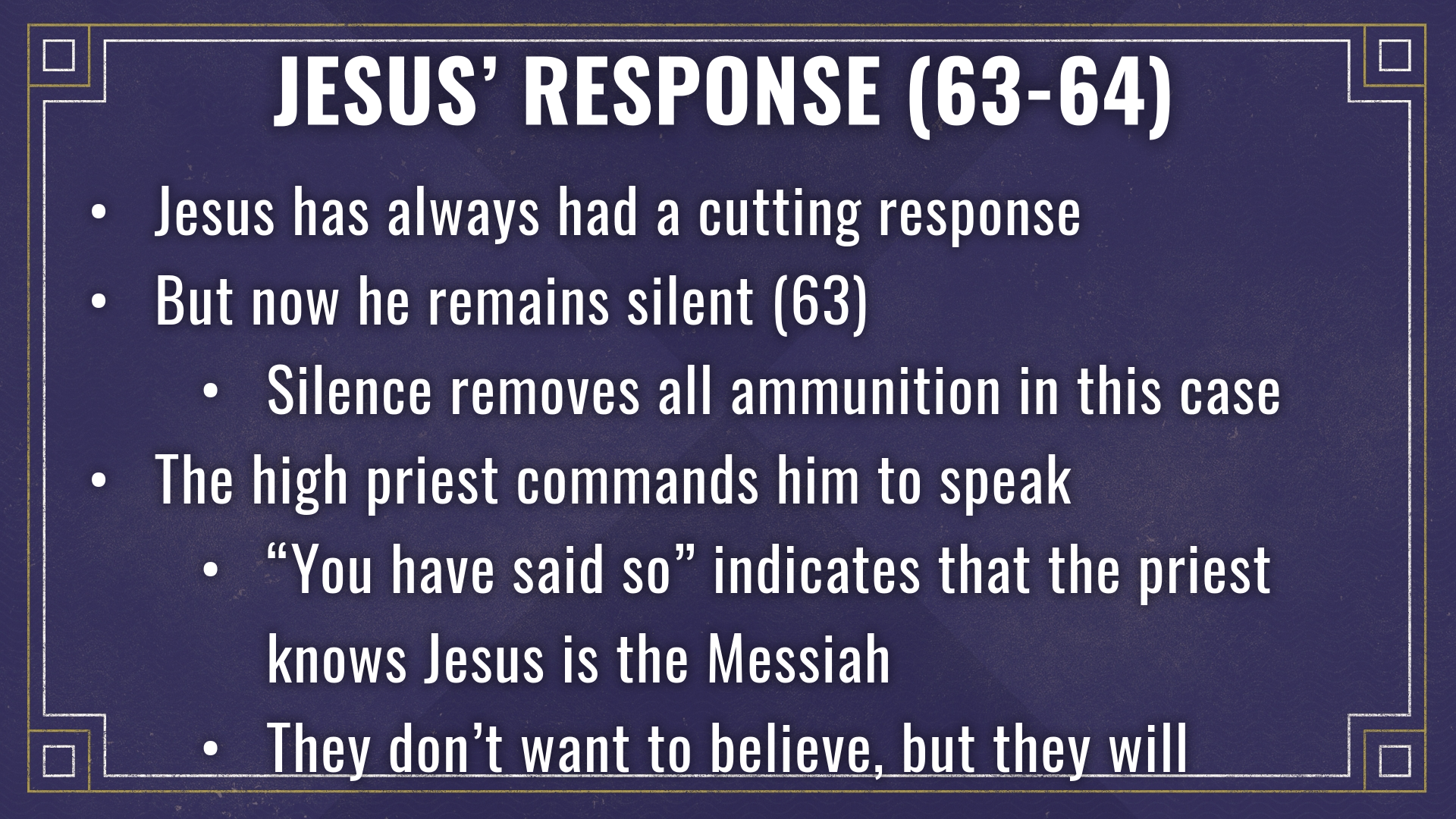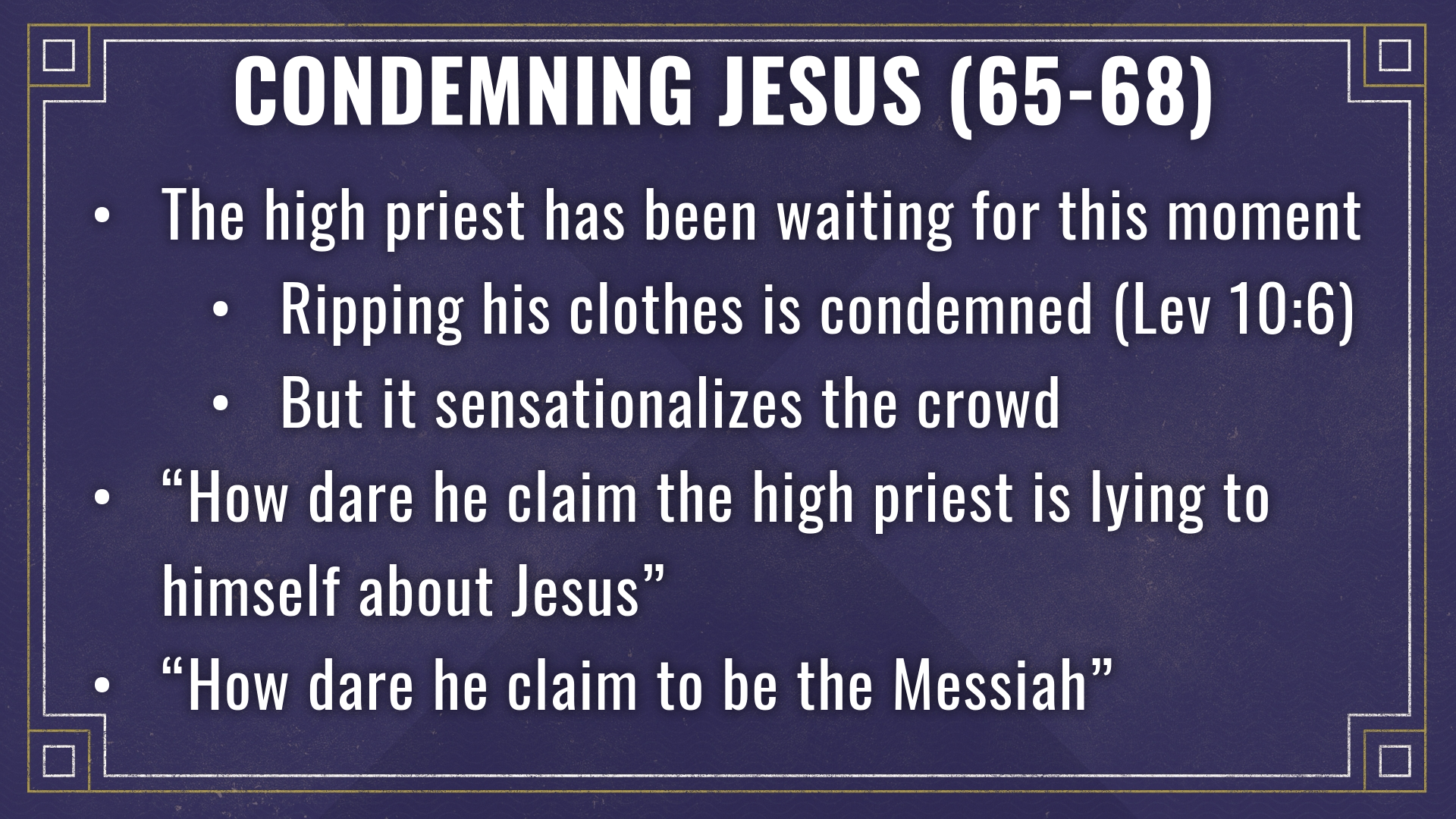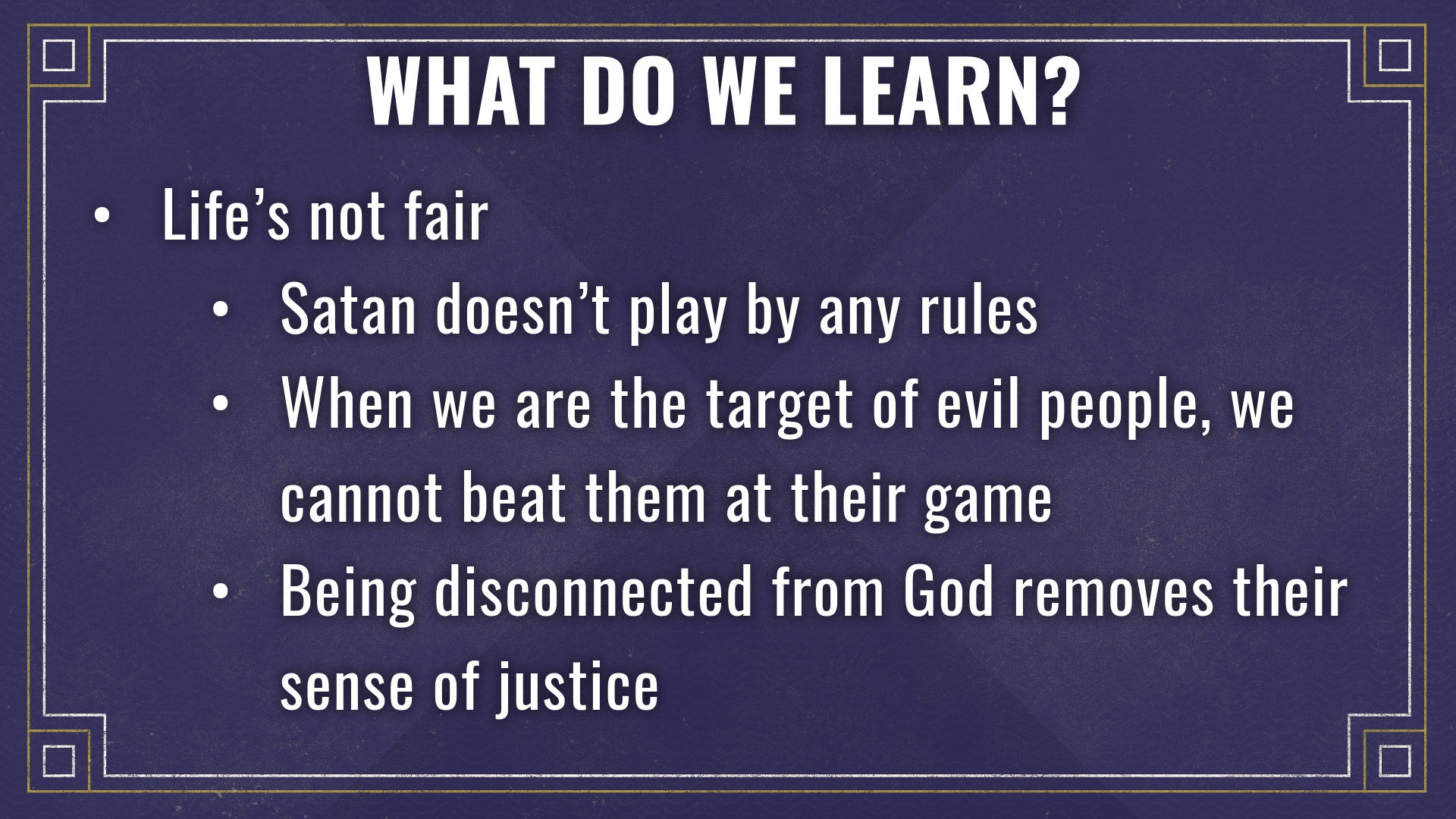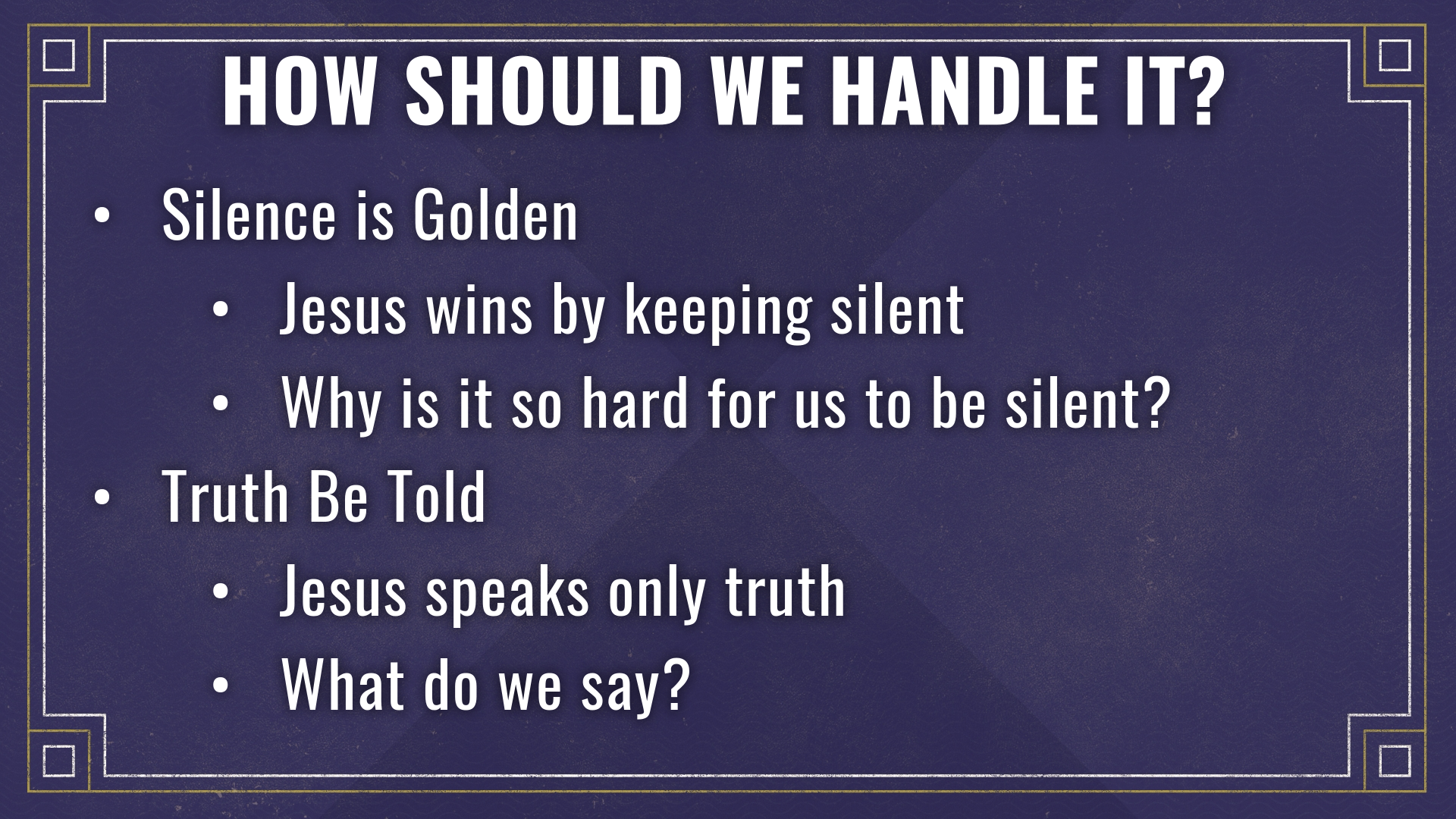Facing Injustice (Matthew 26:57-68)
A Mock Trial
Matthew 26:57--62 (ESV) --- 57 Then those who had seized Jesus led him to Caiaphas the high priest, where the scribes and the elders had gathered. 58 And Peter was following him at a distance, as far as the courtyard of the high priest, and going inside he sat with the guards to see the end. 59 Now the chief priests and the whole council were seeking false testimony against Jesus that they might put him to death, 60 but they found none, though many false witnesses came forward. At last two came forward 61 and said, “This man said, ‘I am able to destroy the temple of God, and to rebuild it in three days.’ ” 62 And the high priest stood up and said, “Have you no answer to make? What is it that these men testify against you?”
We pick up where we left off last week. Jesus has been arrested after being betrayed. Now he is brought to the high priest's house, where scribes and elders have gathered so that they can conjure up a plan. They cannot kill him. If they kill him, the Romans will come in and make a mess of their whole operation. They need a good solid reason for the Romans to put him to death. The only problem is that they can't find one. Jesus has done nothing wrong. He is innocent.
After many false witnesses come forward to accuse Jesus of something worthy of death, the religious leaders are left empty-handed. Apparently, their accusations aren't airtight. It needs to be something substantial and something they can bring before Pilate. Finally, men come forward with a misinterpretation of Jesus' words. They misquote Jesus as saying that he can destroy the temple and rebuild it in three days. In John 2, we read about Jesus telling the Jews that he will raise it in three days when they destroy this temple (referring to his body).
Jesus never said that. He could do that, but he never said that. Don't you hate it when people misquote you? Still, this is a crime that is only worthy of death under Jewish law. The Romans don't punish according to Jewish law. So, how will they get this to work out? It shouldn't.
Jesus' Response
All of this trial is fascinating. Who arrests someone without having an accusation against them? It is so unjust. How will Jesus respond? They want him dead for evil reasons, so they seek out a justifiable reason. All the while, they are acting like they are righteous in doing so.
Matthew 26:63--64 (ESV) --- 63 But Jesus remained silent. And the high priest said to him, “I adjure you by the living God, tell us if you are the Christ, the Son of God.” 64 Jesus said to him, “You have said so. But I tell you, from now on you will see the Son of Man seated at the right hand of Power and coming on the clouds of heaven.”
Silence
At first, Jesus says nothing. He waits for them to do the evil they have planned in their hearts. He has submitted his will to the will of God, and he is not going to try to get out of it. Can you imagine how difficult that would be? The high priest wants him to say something in his defense. If he says nothing, the high priest has no ammunition to destroy him with. He silently receives multiple false accusations against him. Then, he allows them to misrepresent what he says. Next time we watch a Presidential Debate, count the number of times that the man or woman denies that they said what they said. It's really hard to let men and women run your name in the ground whether you say something evil or not.
You Have Said So
So the high priest "Adjures" Jesus, meaning he commands him to speak as his high priest, or else he will invoke a curse upon Jesus. He wants Jesus to say whether he is Christ or not. Consider how easy of a question this is. All Jesus has to do is say, "I am not," and they might leave him alone. This is also an opportunity for him to say, "I am," and blow them away.
But Jesus says, "You have said so." He has said so? When did the high priest say this? This phrase is like what Jesus told Judas. Judas asked the question, "Is it I Lord?" He asked if he was the betrayer Jesus predicted. Jesus responded, "You have said so." This means that Judas and the high priest know the answer in their heart. Judas knew he was the betrayer. Inside he said, "I'm the man he's talking about." The high priest knew that Jesus was the Christ. Inside he said, "This man is the Messiah." But he doesn't want him to be. He refuses to submit to his authority because he wants that authority for himself.
Why are they this way? The root of their problem is that they weren't listening to the conscience inside of them that told them to submit to Jesus as their Messiah. Inside they knew that this guy was nothing like anything they had ever seen before.
Can we learn from that? Do we ignore our evil motives and try to make ourselves seem reasonable? These religious leaders were willing to go against what they knew was true to enjoy their lives as the religious leaders. Giving into Jesus meant giving up their role. It meant giving up the power and wealth they had accumulated for themselves. They couldn't sell sacrifices in the temple anymore. They would have to serve sinners instead of condemning them.
Are we like them? Inside do we know that Jesus is the Christ, but are we unwilling to submit to Jesus and the total transformation he calls for us to have? Belief is about more than knowing Jesus is the Christ. There has to be submission.
Condemnation
Then, Jesus tells him that he "will see the Son of Man at the right hand of Power and coming on the clouds of heaven." This is a threat. Jesus tells the high priest that he will come back with power and judge those who kill him. They won't get away with this. They have set up an evil trial to murder an innocent man, but Jesus will execute justice and judge the guilty.
Matthew 26:65--68 (ESV) --- 65 Then the high priest tore his robes and said, “He has uttered blasphemy. What further witnesses do we need? You have now heard his blasphemy. 66 What is your judgment?” They answered, “He deserves death.” 67 Then they spit in his face and struck him. And some slapped him, 68 saying, “Prophesy to us, you Christ! Who is it that struck you?”
The result of Jesus speaking the truth is his condemnation, beating, and mockery. To show his anger, the high priest tears his clothes (something they were forbidden to do in Lev 10:6). This fires up the crowds to say that he deserves death. How dare he tell the high priest that he is doing something evil. The high priest is above accusation.
What Do We Learn?
This trial is irritating. It's not right. To start with, they arrested him because they were jealous of him. They didn't arrest him because he did something wrong. If he said something blasphemous and that was a call for death, why didn't they arrest him sooner? If this was the reason for the arrest, why not start with that accusation? It's not fair.
It's Not Fair
The first thing that we need to learn is that Satan doesn't play by the rules. He is the prince of the power of the air, and he is working in men to cause other men great suffering. This is his purpose, and he will accomplish it by any means necessary. In this case, he accomplishes the murder of Jesus through the religious leaders. He made them so in love with themselves and addicted to their power that they can't imagine allowing Jesus to live.
How does that fit into our lives? We need to understand that men are under Satan's influence, and those who are the most zealous will find a way to accomplish what they want. Their standard of morality is a moving object. When we go against evil people, we will find out that those people are not playing by our rules. That means that we cannot beat them. We can try, but sooner or later, they will win. The only way we could win is if we compromise, and if we compromise, we lose too.
Any time we are put on trial by someone who is completely wrapped up in themselves, we need to understand that the rules have flown out the window. Notice that these are religious leaders, but they are completely disconnected from God. They live for the world and themselves. This allows them to justify all kinds of evil. The more disconnected they are from God, the farther away from true justice they will land.
Silence is Golden
That's kind of depressing. We don't want to lose. The next thing we learn is that Jesus wins in this trial by keeping silent. The high priest got nothing out of Jesus by bringing false accusation after false accusation against him. Why would they do that? Their goal is to make Jesus lose control and do something deserving of death.
Our words condemn us. If we speak out of desperation and fear, we might admit to something we didn't do. If we speak out of anger, we might do something deserving of punishment. How hard is it to be silent when evil men are accusing us? I not only want to defend myself. I also want to accuse them of things they may or may not have done. James warns us about the danger of using our tongue. Using it is like starting a fire in a dry forest.
James 3:1--10 (ESV) --- 1 Not many of you should become teachers, my brothers, for you know that we who teach will be judged with greater strictness. 2 For we all stumble in many ways. And if anyone does not stumble in what he says, he is a perfect man, able also to bridle his whole body. 3 If we put bits into the mouths of horses so that they obey us, we guide their whole bodies as well. 4 Look at the ships also: though they are so large and are driven by strong winds, they are guided by a very small rudder wherever the will of the pilot directs. 5 So also the tongue is a small member, yet it boasts of great things. How great a forest is set ablaze by such a small fire! 6 And the tongue is a fire, a world of unrighteousness. The tongue is set among our members, staining the whole body, setting on fire the entire course of life, and set on fire by hell. 7 For every kind of beast and bird, of reptile and sea creature, can be tamed and has been tamed by mankind, 8 but no human being can tame the tongue. It is a restless evil, full of deadly poison. 9 With it we bless our Lord and Father, and with it we curse people who are made in the likeness of God. 10 From the same mouth come blessing and cursing. My brothers, these things ought not to be so.
Do we see our tongues in this way? How often do we feel obligated to speak? Some of us cannot control ourselves. We have to say what's on our minds to straighten the record. We cannot allow people to think that we have done something that we haven't done. But the interesting thing is that silence is more powerful than anything we would say. The best thing we can do for ourselves is maintain the impression of righteous living. Our righteous and holy lives will speak for themselves.
When I was in WPB, Brent had accusations against him by a disgruntled member who thought he should do more than he did. Brent told me, "This is why we work as hard as we do at keeping our nose clean. When people bring up an accusation against us that is not true, we want people to think, 'That's nothing like the person I know. He would never do that.'" This is the way we should all be.
When someone close to us brings up any untrue accusation against us, our unwillingness to verbally abuse them makes them feel ashamed. It won't take long for them to backtrack. But if we "let them have it," they will walk away feeling justified and feeling as though we are guilty.
Truth Be Told
But Jesus doesn't stay silent forever. When the high priest threatens to curse him, he speaks, and his words are piercing. Wouldn't it be nice to know what people are really thinking? Jesus can see right through them and their evil intentions. He even knows that they know who he is. What an example Jesus gives us to follow. So many times, I wish I could come up with the right words for the right moment.
He tells them what he knows in the shortest way possible. The truth is that he will return in judgment against all who rejected him. This is not a truth they want to hear, but he lets the truth be known, showing that he is not afraid of what they will do.
When we are on trial, we will do well to remain silent when people speak falsely about us. But if we must speak to maintain honor and reverence to those in authority, let us speak only what we know is absolutely true---no spewing out accusations of our own, cursing, or hurtful words. We need to speak what is true. Then, let us keep silent again.
Jesus Is Faithful
Finally, we learn in this that Jesus is going to be faithful to his promise. When he said, "Not my will but yours be done," he meant it. He will face the cross at the hands of evil men as he said he would. He will always do what he says. He always keeps his promises. What a wonderful treasure that is for us to consider. That should give us reassurance that we can trust him with our lives.
Conclusion
As we consider the trial of Jesus, we have to notice his commitment to God's will. He is focused on keeping his promises, and he remains faithful so that we can find strength and encouragement in him. He promised to die, to live, to judge, and to forgive. Jesus will fulfill all four promises because he is faithful. Aren't we glad about that? We can trust him because he always does what he says he will do.
The faithfulness of Jesus helps us develop greater faithfulness. We can be a part of the covenant community in Christ and be transformed from selfish spiteful people to men and women who glorify God. We can endure tremendous injustice because the grace of God is our motivation. Once we submit to Christ, we can start standing on solid ground with our feet firmly planted in truth.

